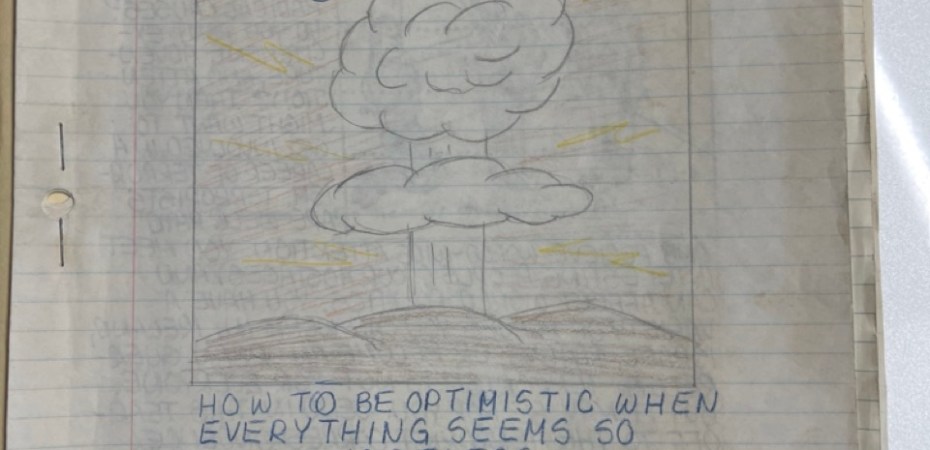In junior high, my friends and I made a “magazine” with a bunch of our cartoons stapled into booklet form in the style of our beloved National Lampoon. It was something I didn’t continue in high school, mostly because I got serious about writing and getting my work published in actual magazines. But late in my senior year of high school, I made one more of those magazines. It was called, “How to be Optimistic when Everything Seems So Hopeless.”
I recently found and reread this magazine, and it was as dark as it sounds. But it also gave me insight on how we can deal with this current difficult time.
Let me set the scene for you. Throughout high school, I was floating in the bubble of an innocent world of my own. I had a sheltered upbringing and was getting constant praise for being smart and doing well in school. My high school experience reinforced this. I was getting straight As and recognition for my writing. I enjoyed the spotlight that came from Vocal Ensemble. Except for one horrible event, my years in high school were pleasant and happy. Or at least the type of pleasant and happy that comes from being somewhat detached and not completely aware.
But bubbles eventually burst. That’s what happened in Spring 1979.
My mom had the first of a series of strokes. It wasn’t the big one that happened in September 1979 that left her paralyzed for the rest of her life. But she was out of work for several months. I had a hard time processing it. She seemed OK. She seemed like she was getting better. Circumstances still seemed normal enough that I could focus on finishing high school. But at a subconscious level, I sensed something was wrong. When my AP History teacher asked us to write a paper about what we thought would happen if Trotsky had taken over the Soviet Union instead of Stalin, I included a detailed description of a person suffering a stroke.
I also had a few experiences that showed me that being a nice person, a good writer, and a top student didn’t automatically grant me recognition and appreciation. I felt like a fool. That time was the lowest I ever felt in high school.
I made that magazine during that low time. That low was reflected in the anger and cynicism of my cartoons and stories. I never showed that magazine to anyone, which was a good thing. Just creating it was therapeutic.
Things got better in my last weeks of high school. I got the recognition I was hoping for in our Senior Awards ceremony. I graduated with honors as one of our class’s valedictorians. I even got my picture in the paper.

Things were great until they weren’t.
What I learned is whatever you’re going through in life is temporary. Bad times don’t last forever. Good times don’t either. Understanding this helps you avoid the traps of despair and complacency.
When times are good, enjoy them. But don’t be frivolous and don’t assume your good fortune will never end. Save up for the lean times. Invest in yourself to gain the skills, tools, and strength to keep you going. Stay alert for trouble. When you have privilege and money, use them to help others, support causes you believe in, and fight against those who will strip others of their rights and dignity.
When times are bad, it’s OK to be angry and heartbroken. But do not give up. Keep moving ahead in your life. Search for opportunities. Find whatever joy you can. Persistence is what will get you through whatever challenges you’re facing. And when you find victories, no matter how small, celebrate them.
The way to be optimistic when everything seems so hopeless is to understand that hopeless times don’t last. They didn’t for me. And they won’t for you. Vent when you have to, even if you have to draw your angriest cartoons and write your bitterest stories in a booklet. Then turn the page and move forward.




